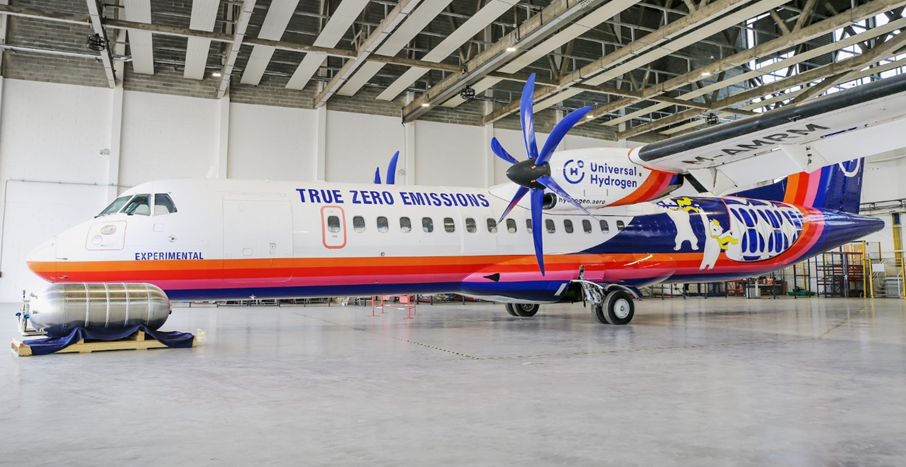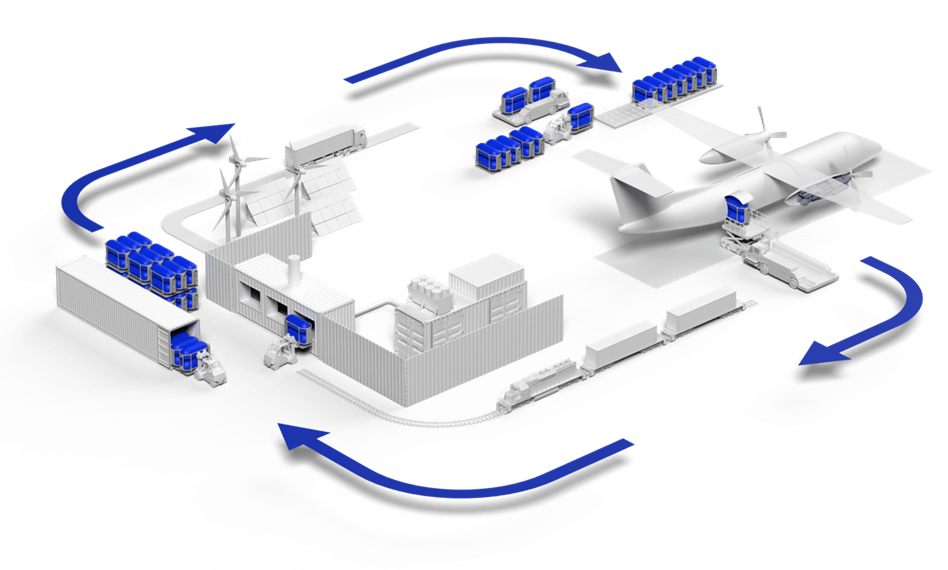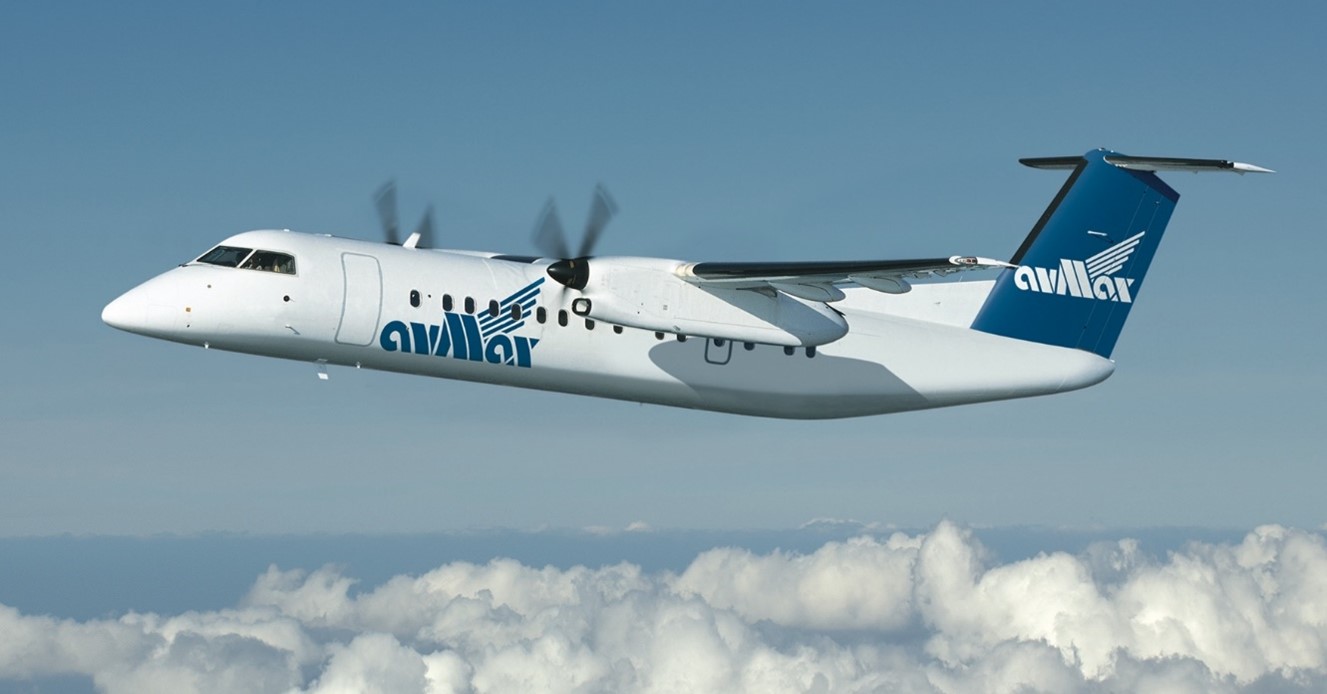
With the help of a growing network of investment and technology partners, Universal Aviation is building momentum for its innovative approach to hydrogen and fuel cell-powered commercial flight. American Airlines recently joined its pool of investors, while a growing roster of industry partners and customers are focused on applying its novel hydrogen infrastructure scheme and fuel cell powertrains to future aircraft.
This investment by American, made in October, makes it the first U.S. airline to make two direct investments focused on the development of both hydrogen-electric propulsion technology and hydrogen distribution logistics. In August, it invested in UK-based ZeroAvia, a developer of hydrogen-electric powertrains, while securing an opportunity to order up to 100 engines from ZeroAvia’s development program to power the carrier’s regional jet aircraft. American joins a prestigious list of investment partners for Universal including Airbus, GE Aviation, Toyota Ventures, Jet Blue and Plug Power.

The Universal fuel distribution network uses modular hydrogen capsules that are handled like cargo, eliminating the need for new fueling infrastructure at airports and speeding up fuel-loading operations. Hydrogen deliveries for regional aircraft are expected to begin in 2025 with plans to expand services to larger, single-aisle aircraft — first for auxiliary power in the late-2020s and then as a primary fuel by the mid-2030s.

“Together with our investors, we are putting together the end-to-end value chain to make hydrogen aviation a near-term commercial reality,” said Paul Eremenko, co-founder and CEO of Universal Hydrogen. “This move by American is a strong signal that customers want a true zero-emissions solution for passenger aviation and are willing to back tangible, pragmatic steps to get there quickly.”
Technology and industry partnerships with Universal are mounting up, too. A recent collaboration with DAT A/S and Everfuel A/S is aiming to transform regional aviation in Denmark by enabling completely zero-emissions flight using clean hydrogen by the end of 2025. The three companies plan to combine their respective expertise in flight operations, hydrogen fuel production, and hydrogen logistics and aircraft propulsion to bring into service hydrogen-powered ATR 72-600 regional aircraft on DAT routes in Denmark, with the goal of converting all of DAT’s domestic flights to true zero emission flights by 2030.
DAT is an experienced regional operator transporting close to one million passengers annually within Denmark and to destinations across Europe. It plans to use ATR 72s converted using Universal Hydrogen technology. The aircraft will accommodate 56 passengers following conversion to hydrogen. Universal Hydrogen will also provide fuel services using its modular capsules to supply green hydrogen produced by Everfuel.
“The domestic flight of the future in Denmark can become 100% emission-free via hydrogen-powered aircraft,” said DAT director Jesper Rungholm. “Universal Hydrogen is in the advanced stages of developing a modification for our regional aircraft type, the ATR 72, making this possible as early as 2025. It will be perfectly suited to typical flight distances in Denmark, and we are sure that customers will value flights that only emit clean water.”
Everfuel, an energy production and distribution company based in Herning, Denmark, will produce the green hydrogen for the partnership using renewable energy at its first power-to-X plant in Fredericia. “At Everfuel, we are excited about the new collaboration, as our entire mission is to achieve a fossil-free society,” said Everfuel CEO Jacob Krogsgaard.

In Canada, Universal is working on an order from Avmax Aircraft Leasing to convert 20 regional aircraft to run on green hydrogen. Avmax has the flexibility to select between Universal Hydrogen’s ATR 72-600 and Dash 8-300 conversion kits. Further, Universal Hydrogen will provide hydrogen fuel to power both Avmax’s leased and owned fleets. A large regional lessor, engineering house and aircraft operator, Avmax could also become an operations partner to Universal. “This order is an important step for Canada’s sizable regional aviation market, which is home to the largest turboprop fleet in the world with nearly 300 Dash-8s and 50 ATRs servicing over 120 airports,” notes Eremenko.
Earlier, Universal forged a key technology partnership with hydrogen aviation pioneer H3 Dynamics. A developer of advanced aerial mobility technologies including zero emission hydrogen-electric propulsion, H3 is implementing what it describes as a sustainable, safety-first 3-phase roadmap, starting with autonomous data services, moving next to autonomous hydrogen cargo, and passenger flight as a final step. The company services clients globally from its three regional headquarters in Austin, Singapore, and Paris.
“New industries are seldom built by one individual or one company,” said Taras Wankewycz, founder and CEO of H3. “They require coalitions and ultimately entire ecosystems. At H3 Dynamics, we have more than a decade of experience in hydrogen-powered flight, with a focus on powertrains for unmanned—and soon manned—aircraft,” he said. “And as Universal Hydrogen is clearly positioned to lead the market in hydrogen fuel services for aviation, it is natural for our companies to work together to make true zero emissions flight a reality.” The two companies plan to leverage their respective strengths to build scale with greater speed in the hydrogen aviation space.
The collaboration will initially focus on the full range of unmanned aircraft, from small drones to large unmanned cargo delivery, with H3 Dynamics developing and supplying fuel cell powertrain solutions and Universal Hydrogen providing green hydrogen fuel logistics using its modular capsule technology. The partnership extends to manned aircraft, including eVTOL and other light aircraft segments. The two companies also agreed to collaborate in the regional aircraft market, focusing on new-build regional airliners with a distributed propulsion architecture.
“This partnership is an instant force multiplier for the scale and reach of both companies and will enable us to move faster to offer true zero-emissions solutions across a broad range of aircraft,” said Eremenko. “Energy transition for a complex and expansive sector like aviation requires a whole-value chain approach, where each segment of the hydrogen value chain is ready at the same. This collaboration allows us to complete the hydrogen value chain for several rapidly growing aviation segments, and to do it much more quickly.” For more info, see www.hydrogen.aero, www.everfuel.com, www.h3dynamics.com, www.zeroavia.com.



